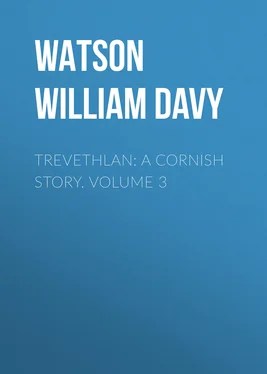William Watson - Trevethlan - A Cornish Story. Volume 3
Здесь есть возможность читать онлайн «William Watson - Trevethlan - A Cornish Story. Volume 3» — ознакомительный отрывок электронной книги совершенно бесплатно, а после прочтения отрывка купить полную версию. В некоторых случаях можно слушать аудио, скачать через торрент в формате fb2 и присутствует краткое содержание. Жанр: foreign_prose, foreign_antique, на английском языке. Описание произведения, (предисловие) а так же отзывы посетителей доступны на портале библиотеки ЛибКат.
- Название:Trevethlan: A Cornish Story. Volume 3
- Автор:
- Жанр:
- Год:неизвестен
- ISBN:нет данных
- Рейтинг книги:5 / 5. Голосов: 1
-
Избранное:Добавить в избранное
- Отзывы:
-
Ваша оценка:
- 100
- 1
- 2
- 3
- 4
- 5
Trevethlan: A Cornish Story. Volume 3: краткое содержание, описание и аннотация
Предлагаем к чтению аннотацию, описание, краткое содержание или предисловие (зависит от того, что написал сам автор книги «Trevethlan: A Cornish Story. Volume 3»). Если вы не нашли необходимую информацию о книге — напишите в комментариях, мы постараемся отыскать её.
Trevethlan: A Cornish Story. Volume 3 — читать онлайн ознакомительный отрывок
Ниже представлен текст книги, разбитый по страницам. Система сохранения места последней прочитанной страницы, позволяет с удобством читать онлайн бесплатно книгу «Trevethlan: A Cornish Story. Volume 3», без необходимости каждый раз заново искать на чём Вы остановились. Поставьте закладку, и сможете в любой момент перейти на страницу, на которой закончили чтение.
Интервал:
Закладка:
But the proposal led to great demur. Randolph abhorred the idea of accepting anything like favour from any of his enemy's house; and was not disposed to admit Mrs. Winston's view of her independence. Yet, being married, she might be considered as no longer involved in the quarrel. And Randolph was very anxious to find his sister a home. She was in his way. He felt it with no want of affection. But whenever in his reveries he looked forward to the career he should adopt, as soon as he had re-established the good fame of his family, his sister always recurred to his mind as an obstacle in his path. Sketching for himself an adventurous course in some far-distant land, he was always recalled from the vision by the thought of her he should in such case be compelled to leave unprotected, behind. A very short glimpse into the future would have spared him much fruitless speculation.
Helen, with that gentle longing for a reconciliation which she showed in the very opening of this narrative, read Mrs. Winston's letter with pleasure, and desired to accept the invitation. In answer to her brother's peevish dissatisfaction, she urged that her visit might be very short, but that it would be ungrateful, uncharitable, every way perverse, to reject what was offered with such true kindness. She should be entirely private,—should, of course, hold no intercourse with Mr. or Mrs. Pendarrel, and could see Randolph as often and as freely as he pleased.
The chaplain supported Helen's argument with all his power. And in the end the brother yielded, little thinking to what a train of circumstances the visit would give rise. And so Miss Trevethlan removed to Cavendish-square, where Gertrude's winning demeanour soon put her completely at her ease, and where she walked through those same rooms, in which she might remember that Randolph encountered Mrs. Pendarrel face to face, and made the avowal which cut short his career as a student of the law.
He himself escorted her, and quivered a little as he stood in the well-remembered drawing-room. But he only staid a few minutes before returning to Hampstead, through the long and squalid suburb which then lay at the foot of the hill. The stuccoed terraces of the Regent's-park were still in the brain or the portfolio of the architect. The realization of Darwin's prophecy,
"Soon shall thy arm, unconquered Steam, afar
Drag the slow barge, or drive the rapid car,"
although it had taken place on one element, seemed as far distant on shore as when the poet wrote. What wonders have been wrought in these thirty years of peace! And is it possible to think, that once more our progress may be arrested by war, and that the energies which have so long been devoted to the cause of civilization—that great cause of the whole human race, in which nations may fraternize without reciprocal encroachment, which is identical with the advance of true liberty, and of the only equality which mortals can attain, that of virtue—is it possible that these energies can once more be required for self-defence, that the death-drum may again summon us to repel a foreign foe, or that symbols and watchwords may divide ourselves, and our ancient flag find a rival standard unfurled by the sons of those who fought the battle of freedom? Rather let us hope that the convulsions around us may be found to have cleared the air, and brought the day more near,
"When the drum shall throb no longer, and the battle-flag be furled,
In the parliament of man, the federation of the world."
The coming of Polydore Riches was an event of some interest to the worthy couple of the peachery. Clotilda, in common with most spinsters of her age, was much in the habit of criticising the mien and aspect of clergymen, and formed her own idea of the appearance of the chaplain from the respect and affection with which Helen always spoke of him. And it must be owned she was a little disappointed. She had expected rather a portly man, with white hair, and a commanding presence. She encountered a slight figure and a pale face, the habitual pensiveness of which was now deepened by anxiety, and which was shaded by locks wherein silver had as yet but little share. Miss Peach allowed that Polydore was "interesting," but she had expected something more.
But Randolph was quite right in predicting that the chaplain and Cornelius would agree together admirably. The two old bachelors speedily conceived a high mutual esteem. Their tastes were very similar. In each there was the same simplicity of character. Polydore was more refined and enthusiastic; Cornelius more humorous and practical. The worthy host soon prevailed on his new friend to join him in a pipe, a luxury in which the chaplain had scarcely indulged since he quitted the classic shades of Granta. And they exhaled the fragrant fumes, due to Peach's ancient friend Sir Walter, so long, that the old clerk fell into a rhapsody on the perfections of that creature of his dreams, Mabel; and actually extracted from Polydore a murmured panegyric on that treasure of his memory, Rose Griffith. And then might a spectator have been amused to observe how the names of Mabel and Rose alternated with the puffs of smoke, and were often sighed forth in concert, with a pathos that might have done honour to the unworthily-used Malvolio.
CHAPTER V
Margaret. To me what's title when content is wanting?
Or wealth, raked up together with much care,
And to be kept with more, when the heart pines,
In being dispossessed of what it longs for
Beyond the Indian mines? Or the smooth brow
Of a pleased sire, that slaves me to his will,
Leaving my soul nor faculties nor power
To make her own election?
Allworth. But the dangers
That follow the repulse,–
Margaret. To me they're nothing:
Let Allworth love, I cannot be unhappy.
As Mr. Winston's suggestion to his wife, that she should ask Miss Trevethlan to their house, seemed suddenly to improve their mutual understanding, so did Helen's acceptance of the invitation make them still better known to each other. Among the commonest and worst features of unions like theirs, is a prejudice on one side or the other that happiness is impossible, which closes every avenue to amelioration. The discontented parties have eyes only for defects. The heart which accepted the match with ill-disguised repugnance, is subsequently too proud to admit it was in error. It will not resign the privilege of complaint. It insists on continually galling itself with what it calls its chains. It hugs the satisfaction of considering itself ill-used. For the world, it would not allow itself, even in reverie, to be at ease. Yet, when there is no real deficiency either in character or temper, a hopeful spirit will probably soon find grounds for esteem, and esteem will be likely to ripen into affection. And then the very contrasts of disposition which at first appeared to preclude sympathy, will really promote it, by furnishing opportunities for good-humoured mirth, instead of objects for silent peevishness.
Gertrude Winston had never thought it worth her while to understand her husband. She married him as a pure negation, preferring King Log to King Stork. He was neither sulky, nor mean, nor selfish; he was not meddlesome, nor fidgety, nor exacting. His wife never heard a sharp word from his lips. Surely she might have taken the trouble to go a little below the surface, and see if his pedantry and apathy concealed no qualities which she might first admire, and then love. But no; she had determined to be a "victim," and resolutely closed both heart and mind against any appreciation of whatever might be endearing in his disposition. And for him,—indolent and even-tempered, having married because people usually married, in the same way as they were born and buried,—he certainly took no pains to display his merits, and allowed his wife to do exactly as she pleased, without let or hinderance.
Читать дальшеИнтервал:
Закладка:
Похожие книги на «Trevethlan: A Cornish Story. Volume 3»
Представляем Вашему вниманию похожие книги на «Trevethlan: A Cornish Story. Volume 3» списком для выбора. Мы отобрали схожую по названию и смыслу литературу в надежде предоставить читателям больше вариантов отыскать новые, интересные, ещё непрочитанные произведения.
Обсуждение, отзывы о книге «Trevethlan: A Cornish Story. Volume 3» и просто собственные мнения читателей. Оставьте ваши комментарии, напишите, что Вы думаете о произведении, его смысле или главных героях. Укажите что конкретно понравилось, а что нет, и почему Вы так считаете.












